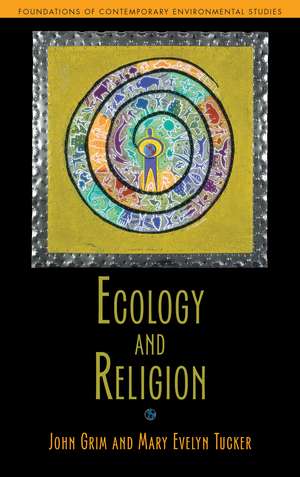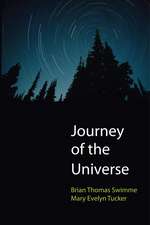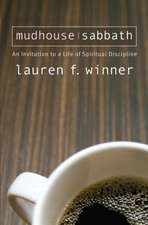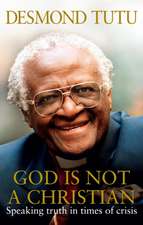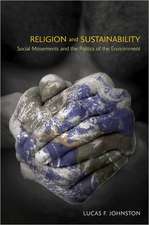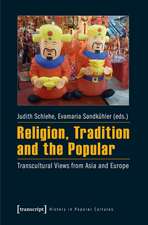Ecology and Religion: Foundations of Contemporary Environmental Studies Series
Autor John Grim, Mary Evelyn Tuckeren Limba Engleză Paperback – 2 ian 2014
From the Psalms in the Bible to the sacred rivers in Hinduism, the natural world has been integral to the world’s religions. John Grim and Mary Evelyn Tucker contend that today’s growing environmental challenges make the relationship ever more vital.
This primer explores the history of religious traditions and the environment, illustrating how religious teachings and practices both promoted and at times subverted sustainability. Subsequent chapters examine the emergence of religious ecology, as views of nature changed in religious traditions and the ecological sciences. Yet the authors argue that religion and ecology are not the province of institutions or disciplines alone. They describe four fundamental aspects of religious life: orienting, grounding, nurturing, and transforming. Readers then see how these phenomena are experienced in a Native American religion, Orthodox Christianity, Confucianism, and Hinduism.
Ultimately, Grim and Tucker argue that the engagement of religious communities is necessary if humanity is to sustain itself and the planet. Students of environmental ethics, theology and ecology, world religions, and environmental studies will receive a solid grounding in the burgeoning field of religious ecology.
This primer explores the history of religious traditions and the environment, illustrating how religious teachings and practices both promoted and at times subverted sustainability. Subsequent chapters examine the emergence of religious ecology, as views of nature changed in religious traditions and the ecological sciences. Yet the authors argue that religion and ecology are not the province of institutions or disciplines alone. They describe four fundamental aspects of religious life: orienting, grounding, nurturing, and transforming. Readers then see how these phenomena are experienced in a Native American religion, Orthodox Christianity, Confucianism, and Hinduism.
Ultimately, Grim and Tucker argue that the engagement of religious communities is necessary if humanity is to sustain itself and the planet. Students of environmental ethics, theology and ecology, world religions, and environmental studies will receive a solid grounding in the burgeoning field of religious ecology.
Preț: 207.04 lei
Nou
Puncte Express: 311
Preț estimativ în valută:
39.62€ • 42.36$ • 33.03£
39.62€ • 42.36$ • 33.03£
Carte disponibilă
Livrare economică 27 martie-10 aprilie
Livrare express 12-18 martie pentru 24.93 lei
Preluare comenzi: 021 569.72.76
Specificații
ISBN-13: 9781597267083
ISBN-10: 1597267082
Pagini: 280
Ilustrații: figures, references, appendixes
Dimensiuni: 140 x 222 x 20 mm
Greutate: 0.34 kg
Ediția:None
Editura: Island Press
Colecția Island Press
Seria Foundations of Contemporary Environmental Studies Series
ISBN-10: 1597267082
Pagini: 280
Ilustrații: figures, references, appendixes
Dimensiuni: 140 x 222 x 20 mm
Greutate: 0.34 kg
Ediția:None
Editura: Island Press
Colecția Island Press
Seria Foundations of Contemporary Environmental Studies Series
Notă biografică
John Grim and Mary Evelyn Tucker are Senior Lecturers and Research Scholars at Yale University. They are founders of the Forum on Religion and Ecology at Yale and series editors of Religions of the World and Ecology from the Harvard Center for the Study of World Religions. They won an Emmy for their film Journey of the Universe with Brian Swimme.
Cuprins
Introduction: Our Journey into Religion and Ecology
Chapter 1. Problems and Promise of Religions: Limiting and Liberating
Chapter 2. The Nature of Religion: Orienting, Grounding, Nurturing, Transforming
Chapter 3. Religious Ecology and Views of Nature in the West
Chapter 4. Ecology, Conservation, and Ethics
Chapter 5. Emergence of the Field of Religion and Ecology
Chapter 6. Christianity as Orienting to the Cosmos
Chapter 7. Confucianism as Grounding in Community
Chapter 8. Indigenous Traditions and the Nurturing Powers of Nature
Chapter 9. Hinduism and the Transforming Effect of Devotion
Chapter 10. Building on Interreligious Dialogue: Toward a Global Ethics
Epilogue: The Challenge Ahead: Creating Ecological Cultures Questions for Discussion
Appendix A: Common Declaration on Environmental Ethics of Pope John Paul II and the Ecumenical Patriarch Bartholomew I of Constantinople
Appendix B: Influence of Traditional Chinese Wisdom of Eco Care on Westerners by Vice-Minister Pan Yue, 2011
Appendix C: Selections from the United Nations Declaration on the Rights of Indigenous Peoples, 2007
Appendix D: Yamuna River Declaration, 2011
Appendix E: Earth Charter, 2000
Appendix F: Save the Fraser Declaration
Appendix G: Online Resources for Religious Ecology
Notes
Bibliography
Index
Chapter 1. Problems and Promise of Religions: Limiting and Liberating
Chapter 2. The Nature of Religion: Orienting, Grounding, Nurturing, Transforming
Chapter 3. Religious Ecology and Views of Nature in the West
Chapter 4. Ecology, Conservation, and Ethics
Chapter 5. Emergence of the Field of Religion and Ecology
Chapter 6. Christianity as Orienting to the Cosmos
Chapter 7. Confucianism as Grounding in Community
Chapter 8. Indigenous Traditions and the Nurturing Powers of Nature
Chapter 9. Hinduism and the Transforming Effect of Devotion
Chapter 10. Building on Interreligious Dialogue: Toward a Global Ethics
Epilogue: The Challenge Ahead: Creating Ecological Cultures Questions for Discussion
Appendix A: Common Declaration on Environmental Ethics of Pope John Paul II and the Ecumenical Patriarch Bartholomew I of Constantinople
Appendix B: Influence of Traditional Chinese Wisdom of Eco Care on Westerners by Vice-Minister Pan Yue, 2011
Appendix C: Selections from the United Nations Declaration on the Rights of Indigenous Peoples, 2007
Appendix D: Yamuna River Declaration, 2011
Appendix E: Earth Charter, 2000
Appendix F: Save the Fraser Declaration
Appendix G: Online Resources for Religious Ecology
Notes
Bibliography
Index
Recenzii
"Grim and Tucker integrate vast personal experiences and serious scholarship across multiple global cultures and disciplines to produce keen, fresh insight for today's world. A compelling, inspirational, and hopeful look at a path to a meaningful and sustainable future."
"A must-read for anyone interested in the intersection of ecology, religion, and ethics, and in the role that religions could play in resolving the complex environmental concerns of today."
"An astonishingly comprehensive view of human relations with the natural world."
"The almost unimaginable environmental challenge humanity faces—a daunting Gordian knot of science, plus ethical and moral values—demands ways forward. Those will be found at the intersection of science and religion. Nobody understands this thicket—so filled with hope, promise and complexities—better than John Grim and Mary Evelyn Tucker. Ecology and Religion lights the path forward."
"How wonderful to have the world's leading authorities on religion and ecology, John Grim and Mary Evelyn Tucker, offer this profound but accessible examination of the field just as the world's religions are entering their ecological phase. This book is more than a source of deep understanding—it is an inspiration."
"John Grim and Mary Evelyn Tucker are two of the most well-known figures advocating religious ecologies—the bridging of scientific and religious worldviews. In their book Ecology and Religion, they argue that the religious component is a 'missing link,' 'an important lens whereby humans can understand and reenvision their roles as participants in the dynamic process of life.' …In volumes of this genre, their virtue must mirror their vice—that of being both sketchy and simultaneously insightful. 'Painted in broad brushstrokes,' the book is cosmopolitan in the original Greek sense, as in a citizen of the cosmos."
"...refreshing in its premise that all religions have something important to teach us about how to motivate ourselves and others to act on global climate change, if only we listen, talk, and synthesize."
"...highly recommend this volume for the stated purposes of filling a much-needed niche in the introductory market of religious ecology for undergraduate students. The text provides a highly accessible, broad narrative that could form the core of any class having to do with religious ecology."
Descriere
From the Psalms in the Bible to the sacred rivers in Hinduism, the natural world has been integral to the world’s religions. John Grim and Mary Evelyn Tucker contend that today’s growing environmental challenges make the relationship ever more vital.
This primer explores the history of religious traditions and the environment, illustrating how religious teachings and practices both promoted and at times subverted sustainability. Subsequent chapters examine the emergence of religious ecology, as views of nature changed in religious traditions and the ecological sciences. Yet the authors argue that religion and ecology are not the province of institutions or disciplines alone. They describe four fundamental aspects of religious life: orienting, grounding, nurturing, and transforming. Readers then see how these phenomena are experienced in a Native American religion, Orthodox Christianity, Confucianism, and Hinduism.
Ultimately, Grim and Tucker argue that the engagement of religious communities is necessary if humanity is to sustain itself and the planet. Students of environmental ethics, theology and ecology, world religions, and environmental studies will receive a solid grounding in the burgeoning field of religious ecology.
This primer explores the history of religious traditions and the environment, illustrating how religious teachings and practices both promoted and at times subverted sustainability. Subsequent chapters examine the emergence of religious ecology, as views of nature changed in religious traditions and the ecological sciences. Yet the authors argue that religion and ecology are not the province of institutions or disciplines alone. They describe four fundamental aspects of religious life: orienting, grounding, nurturing, and transforming. Readers then see how these phenomena are experienced in a Native American religion, Orthodox Christianity, Confucianism, and Hinduism.
Ultimately, Grim and Tucker argue that the engagement of religious communities is necessary if humanity is to sustain itself and the planet. Students of environmental ethics, theology and ecology, world religions, and environmental studies will receive a solid grounding in the burgeoning field of religious ecology.
